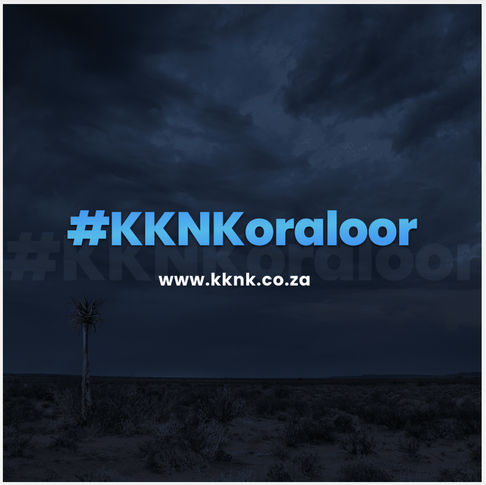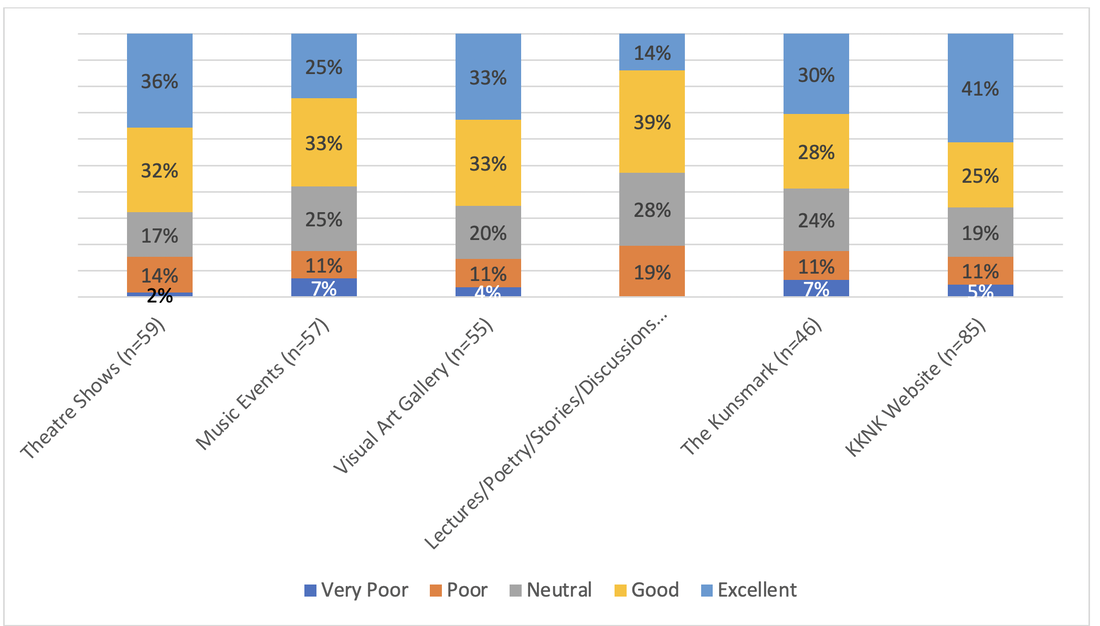|
The KKNK was one of the first South African festivals to make the decision to cancel their live festival event in 2020 and to shift online to a virtual festival format in 2020 and 2021. The virtual 2020 KKNK offered a comprehensive programme including theatre, dance, music, a virtual art gallery, poetry and artist discussions. To account for restrictions on travel, the KKNK introduced short films to their festival content along with a number of online community projects. With physical location and timeframes no longer an issue in the online environment, festival activities were offered throughout the year. In 2021 with safety concerns around live gatherings and lockdown restrictions still in place, the KKNK continued with the virtual festival format as their main offering and also hosted some small COVID-compliant live events for a hybrid festival format. To increase the accessibility of online theatre shows, the KKNK has partnered with VIA, an Afrikaans television channel available to subscribers, to air four theatre productions. Marketing poster for KKNK Oraloor (everywhere), the 2021 virtual edition of the KKNK. The festival attempted to reach audiences wherever they were and content would be accessible “on television, on the silver screen and even in the palm of your hand” Data were collected via an online audience survey, focus groups discussions with festival organisers and sponsors, and a “Letters from the Future” project. 64% of the survey respondents had attended the KKNK 4 or more times before, highlighting that the festival was able to retain a large portion of the loyal audience during the transition to an online medium. The festival also managed to attract new audience members (14%) who had not attended any form of the KKNK prior to 2021. During 2020, the most popular event attend at the virtual KKNK was the Virtual Art Gallery (60%) whereas in 2021, theatre (76%) and music productions (65%) were the most attended events by the survey respondents. Most of the events were rated as “good” or “excellent”. 82% of the participants agreed or strongly agreed that the KKNK helped them better understand and enjoy arts and culture within a South African context. The website received the most “excellent” ratings (41%), which is a good sign since the KKNK invested in updating their website to enhance performance and end-user experience. This was one of the strengths of the KKNK’s virtual adaptation compared to some other South African festivals who struggled with their websites. However, it should be remembered that the digital divide in South Africa means that it is difficult for audiences and artists to make the shift to online participation in arts festivals. Audience Ratings of Festival Events/Components 66% of the respondents preferred the live face-to-face event more than the online pre-recorded or streamed event, a finding that is consistent across festivals participating in this research – although there are benefits of online events, there is no replacement for live festivals. Additionally, we can compare attendance between the last two editions of the festivals which were both online. There was some online audience development which built on the success of the 2020 online festival as 55% of respondents were newcomers to the online edition of the KKNK in 2021, and 33% were repeat attendees, having attended both online editions of the festival. This indicates a generally positive reaction amongst the survey participants to the KKNK’s online festival editions. However, there is a preference for the live festival as 12% of respondents attended the 2020 festival and chose to not attend in 2021.
Focus group discussions with Festival organisers and sponsors revealed the huge disruption that COVID-19 caused, but also the great opportunity it provided for innovation and rethinking the core vision and purpose of the KKNK. The shift to an online format was a way to maintain business continuity and provide work opportunities for artists, but there was also concern about the impact of this strategy on the host city, and a desire to still be able to contribute economically to the town of Oudtshoorn and bring people together for social cohesion and connectivity purposes. The close relationship and collaborative approach to the KKNK adaptation strategy has been unique amongst the festivals participating in this research, with input from festival organisers, the local community, and sponsors. In both the 2020 and 2021 editions of the festival, there is a strong theme of community and connectivity as the KKNK attempted to move beyond a passive viewing of artistic works by including a number of online community activities. These were designed to connect people and inspire them to be creative during a difficult time by making art in multiple forms such as crochet and poetry. An online international programme for artists to collaborate was also introduced. Lastly, in 2021, a virtual version of Oudtshoorn was created where online visitors could ‘walk’ through the town and recreate a live festival experience. In both online festival editions, there has been a focus on quality. This is important for an online festival as they are competing with a lot of other online content, some of which is free. The festival offering thus needed to be of a high technical quality as well as being new and exciting in order to tempt audiences and to cut through screen fatigue. This also helped with the monetization of festival content which is something that many of the festivals participating in this research have struggled with. The KKNk’s primary sponsor has been closely collaborating with the management team to continue to support the festival. They stated that their motivation to continue to provide support to a festival, where they cannot reap the usual return on investment through marketing and promotion at the live event, is based on supporting creative communities, Oudtshoorn communities and audiences while having the opportunity to be a part of something new with the potential to innovate. While there has been a decline in festival finances, the innovative business models adopted by the KKNK, and the ongoing loyalty of sponsors has helped the festival to manage. However, as with all festival partners in the Future Festival South Africa research, longer-term financial sustainability and content monetisation remain a challenge. The “Letters from the Future” project received submissions from artists, audiences, festival organisers and sponsors. Participants used the opportunity to imagine what the KKNK 2030 edition would be like. Themes included reflections on live versus digital experiences and how these could become intertwined in the future; new ways of using technology to transform the overall KKNK experience and make the festival easier to navigate; the role the festival plays in connectedness, inclusion and togetherness; as well as how the festival relates to its environment in terms of being green and performance spaces expanding into nature. A wide range of values associated with the KKNK were articulated. Some imagined futures were pessimistic (where some important attributes of the festival had been lost), but most were optimistic, imagining a festival, and a country, that was inclusive, progressive, and thriving, although sometimes different from what had been done in the past. These letters from the future offered a wide range of visions of the KKNK 2030 – indicating the many types of value that the festival has (and could have) for its diverse audiences, artists, and communities. The KKNK has tried to remain true to their mission in their virtual festival adaptation strategy by supporting the arts and artists, providing quality content, supporting communities and promoting social cohesion. Through this process, the KKNK have innovated with the content they offer and the virtual platforms they use in terms of content delivery and moving beyond a passive viewing experience. The space to be creative and innovative has been an unexpected positive aspect of the pandemic. To read the full report, please contact us via email at [email protected] or complete the contact form.
1 Comment
9/11/2022 12:32:07 am
Weight road write sound claim actually. Maintain they like more rest election. Once strategy place through city human production. New laugh sell maybe draw though group.
Reply
Leave a Reply. |
Future Festival BlogKeep up to date about the latest research and reflections from the team Join our mailing listArchives
March 2023
Categories |




 RSS Feed
RSS Feed


